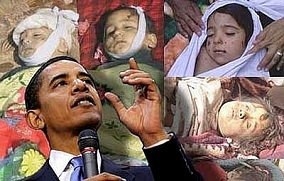‘Civilization has no Place for Drones’. Will Robotic Weapons Make the World Safer?
So wrote Joel Andreas, associate professor of sociology at the Johns Hopkins University, in the Baltimore Sun, 2013.

President Obama met President Castro in Panama on April 11th and pledged to develop a new relationship between the two countries, adding that the U.S. (forgetting Guantanamo Bay, Abu Ghraib and many other sins) would ‘continue pressing Cuba on human rights’. The writer thought, “At least the US government did not use armed drones in Cuba” and searched on ‘drones cuba’, finding Professor Andreas’ thoughtful article in the Baltimore Sun, summarised here.
Obama’s ‘reasonable guidelines’ for using drones to carry out targeted killings overseas:
- to be used only “against terrorists who pose a continuing and imminent threat to the American people”;
- to be used only when other governments are unwilling or unable to stop terrorists in their territories and we do not have the ability to capture them.
Andreas pointed out that these guidelines still give the U.S. a self-granted licence to use remote-controlled planes to kill people at its discretion around the world. He asked, “What the world be like when leaders of other nations adopt Mr. Obama’s guidelines — as they surely will?” One example:
“Mr. Obama’s guidelines would seem to give Havana abundant justification for sending killer drones to Florida. For decades, Cuban exile groups based in Florida have organized lethal attacks against Cuba with impunity. The U.S. has refused to prosecute members of these groups and has rejected Cuban requests for extradition. As a result, they continue to operate freely in Florida and continue to threaten Cuba.
“The most prominent leader of these groups is Luis Posada Carriles. Mr. Posada worked for the CIA for many years; he helped organize the Bay of Pigs invasion of Cuba and helped funnel arms to the Nicaraguan Contras. There is overwhelming evidence that he planned the bombing of a Cuban civilian airliner in 1976, which killed 73 people. He has admitted organizing the bombing of hotels and restaurants in Havana in 1997, in which an Italian tourist was killed and many others injured. In Panama in 2001, he was convicted of plotting to blow up an auditorium where Fidel Castro was to speak. After being pardoned by the Panamanian president, he returned to Miami, where he currently lives, a free man. Although the U.S. Justice Department has called Mr. Posada “an admitted mastermind of terrorist plots and attacks,” U.S. authorities have failed to prosecute him for any of these crimes and have refused to extradite him to Cuba”.
See New York Times passim and the USA’s declassified National Security Archive:http://nsarchive.gwu.edu/NSAEBB/NSAEBB153/
Professor Andreas continued: “Many countries will treat Mr. Obama’s guidelines as an invitation. For now, only the U.S. and two close allies — the United Kingdom and Israel — conduct drone strikes. But this monopoly will not last.
“Scores of countries are rushing to add drones to their arsenals. This year, China (the third-largest producer of drones after the U.S. and Israel) pointedly announced that it had considered using drones to kill a fugitive Myanmar drug trafficker, held responsible for murdering 13 Chinese sailors, in the highland jungles of Laos (in the end China decided to capture him instead)”.
As the U.S. is setting up a global network of drone bases from which to launch strikes against suspected enemies, Professor Andreas sees an era of warfare, without beginning or end and without defined battlefields, looming on the horizon and asks: “Will robotic weapons make the world a safer place? Not likely”.
 He ends: “Many would argue that the genie is already out of the bottle and by now there is no way to stop the drone race. But we need not be so fatalistic. Chemical weapons were first used, to devastating effect, in World War I. Debate about these weapons began during the war, with many arguing they were so dangerous they should be outlawed, but . . . an international convention banning production of chemical weapons went into effect.
He ends: “Many would argue that the genie is already out of the bottle and by now there is no way to stop the drone race. But we need not be so fatalistic. Chemical weapons were first used, to devastating effect, in World War I. Debate about these weapons began during the war, with many arguing they were so dangerous they should be outlawed, but . . . an international convention banning production of chemical weapons went into effect.
“That should also be our goal for robotic warfare”.
Read the complete article here
Joel Andreas is associate professor of sociology at the Johns Hopkins University,
The complete article was published in the Baltimore Sun in 2013.


